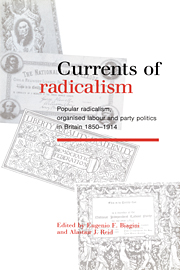 Currents of Radicalism
Currents of Radicalism Book contents
- Frontmatter
- Contents
- Notes on contributors
- Preface
- 1 Currents of radicalism, 1850–1914
- Part I Continuities in popular radicalism
- Part II The Liberal party and the people
- 6 Trade unionists, Gladstonian Liberals, and the labour law reforms of 1875
- 7 Popular Liberals, Gladstonian finance, and the debate on taxation, 1860–1874
- 8 Gladstone and his rivals: popular Liberal perceptions of the party leadership in the political crisis of 1885–1886
- Part III Radicals, Liberals, and the Labour party
- Index
6 - Trade unionists, Gladstonian Liberals, and the labour law reforms of 1875
from Part II - The Liberal party and the people
Published online by Cambridge University Press: 07 September 2010
- Frontmatter
- Contents
- Notes on contributors
- Preface
- 1 Currents of radicalism, 1850–1914
- Part I Continuities in popular radicalism
- Part II The Liberal party and the people
- 6 Trade unionists, Gladstonian Liberals, and the labour law reforms of 1875
- 7 Popular Liberals, Gladstonian finance, and the debate on taxation, 1860–1874
- 8 Gladstone and his rivals: popular Liberal perceptions of the party leadership in the political crisis of 1885–1886
- Part III Radicals, Liberals, and the Labour party
- Index
Summary
There has been surprisingly little modern research on the passage of the labour law reforms of 1875, and that which has been published has emphasised the importance of Disraeli and R. A. Cross, the Conservative Home Secretary, in bringing about a final and comprehensive settlement of the question. The picture which emerges from a reading of general histories of the period is therefore that Gladstone's first ministry, after the ambivalent reforms of 1871, became neglectful or even hostile to the claims of the trade union movement. Then, following the 1874 general election, Disraeli entered office mindful of the opportunity of weakening the electoral base of Liberalism still further; sensitive also to the need to prove the capability of the new Conservative administration by finding solutions to thorny social questions, with the more general intention of wooing the masses away from constitutional and political reform. One result of this was the labour law reforms of 1875, the centrepiece of the social reform ‘initiative’ pushed through by the Conservative government during its first two years in power.
In fact, the passage of the labour law reforms of 1875 was a truly bipartisan effort. As Colin Matthew has indicated, by the autumn of 1873, the previous Liberal administration had moved significantly towards the trade union position. Under the stimulus of the new Home Secretary, Robert Lowe, the Home Office conceded in principle what became the basis of the settlement of 1875.
- Type
- Chapter
- Information
- Currents of RadicalismPopular Radicalism, Organised Labour and Party Politics in Britain, 1850–1914, pp. 109 - 133Publisher: Cambridge University PressPrint publication year: 1991
- 4
- Cited by


